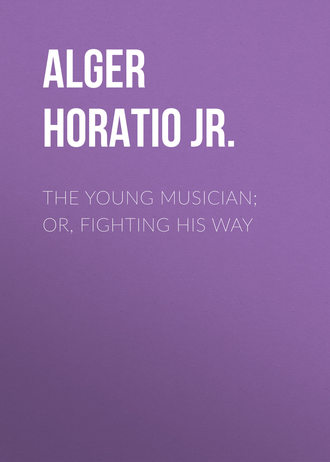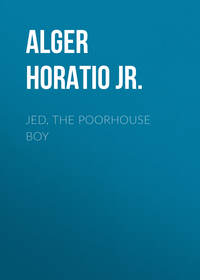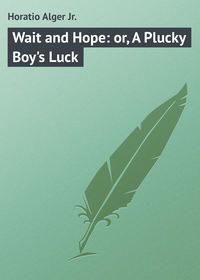
The Young Musician; Or, Fighting His Way
“No; I neither know nor care,” answered Professor Riccabocca loftily.
“But,” said Philip, “I haven’t much money.”
“Nor I,” admitted Riccabocca. “But it is absolutely necessary for us to stop at a first-class place. We must not let the citizens suppose that we are tramps or vagabonds. They will judge us by our surroundings.”
“There is something in that,” said Philip. “But suppose we don’t succeed!”
“Succeed? We must succeed!” said the professor, striking an attitude. “In the vocabulary of youth, there’s no such word as ‘fail’! Away with timid caution! Our watchword be success!”
“Of course, you have much more experience than I,” said Philip.
“Certainly I have! We must keep up appearances. Be guided by me, and all will come right.”
Philip reflected that they could not very well make less than their expenses, and accordingly he acceded to the professor’s plans. They entered the hotel, and Professor Riccabocca, assuming a dignified, important step, walked up to the office. “Sir,” said he, to the clerk, “my companion and myself would like an apartment, one eligibly located, and of ample size.”
“You can be accommodated, sir,” answered the young man politely. “Will you enter your names?”
Opening the hotel register, the elocutionist, with various flourishes, entered, this name: “Professor Lorenzo Riccabocca, Elocutionist and Dramatic Reader.”
“Shall I enter your name?” he asked of Philip.
“If you please.”
This was the way Professor Riccabocca complied with his request: “Philip de Gray, the Wonderful Boy-musician.”
He turned the book, so that the clerk could see the entries.
“We propose to give an entertainment in Wilkesville,” he said.
“I am glad to hear it,” said the clerk politely.
“After dinner I will consult you as to what steps to take. Is there anything in the way of amusement going on in town this evening?”
“Yes, there is a concert, chiefly of home-talent, in Music Hall. There is nothing announced for to-morrow evening.”
“Then we will fix upon to-morrow evening. It will give us more time to get out hand-bills, etc. Is there a printing-office in town?”
“Oh, yes, sir. We have a daily paper.”
“Is the office near at hand?”
“Yes, sir. It is on the corner of the next street.”
“That will do for the present. We will go up to our apartment. Will dinner be ready soon?”
“In half an hour.”
Here the servant made his appearance, and the professor, with a wave of his hand, said:
“Lead on, Mr. de Gray! I will follow.”
CHAPTER XXVI. A PROMISING PLAN
They were shown into a front room, of good size, containing two beds. The servant handed them the key, and left them.
“This looks very comfortable, Mr. de Gray,” said the professor, rubbing his hands with satisfaction.
“Why do you call me Mr. de Gray?” asked Philip, thinking he had been misunderstood. “It is plain Gray, without any de.”
“I am only using your professional name,” answered the professor. “Don’t you know people will think a great deal more of you if they suppose you to be a foreigner?”
Philip laughed.
“Is Lorenzo Riccabocca your true or professional name, professor?” he asked.
“Professional, of course. My real name—I impart it to you in the strictest confidence—is Lemuel Jones. Think of it. How would that look on a poster?”
“It would not be so impressive as the other.”
“Of course not; and the public need to be impressed. I thank thee for that word, Mr. de Gray. By the way, it’s rather a pity I didn’t give you a Spanish or Italian name.”
“But I can’t speak either language. It would be seen through at once.”
“People wouldn’t think of asking. You’d be safe enough. They will generally swallow all you choose to say.”
They went down to dinner presently, and the professor—Philip could not help thinking—ate as if he were half-starved. He explained afterward that elocutionary effort taxes the strength severely, and makes hearty eating a necessity.
After dinner was over the professor said:
“Are you content, Mr. de Gray, to leave me to make the necessary arrangements?”
“I should prefer that you would,” said Philip, and he spoke sincerely. “Probably you understand much better than I what needs to be done.”
“‘Tis well! Your confidence is well placed,” said the professor, with a wave of his hand. “Shall you remain in the hotel?”
“No, I think I will walk about the town and see a little of it. I have never been here before.”
Philip took a walk through the principal streets, surveying with curiosity the principal building’s, for, though there was nothing particularly remarkable about them, he was a young traveler, to whom everything was new. He could not help thinking of his late home, and in particular of Frank Dunbar, his special friend, and he resolved during the afternoon to write a letter to Frank, apprising him of his luck thus far. He knew that Frank would feel anxious about him, and would be delighted to hear of his success as a musician.
He went into a book-store and bought a sheet of paper and an envelope.
He had just completed his letter, when his partner entered the reading-room of the hotel with a brisk step.
“Mr. de Gray,” he said, “I have made all necessary arrangements. I have hired the hall for to-morrow evening—five dollars—ordered some tickets and posters at the printing-office, and secured a first-class notice in to-morrow morning’s paper. Everybody in Wilkesville will know before to-morrow night that they will have the opportunity of attending a first-class performance at the Music Hall.”
“It seems to me the necessary expenses are considerable,” said Philip uneasily.
“Of course they are; but what does that matter?”
“What is to be the price of tickets?”
“General admission, twenty-five cents; reserved seats, fifty cents, and children under twelve, fifteen cents. How does that strike you!”
“Will anyone be willing to pay fifty cents to hear us?” asked Philip.
“Fifty cents! It will be richly worth a dollar!” said the professor loftily.
“I suppose he knows best,” thought Philip. “I hope all will come out right. If it does we can try the combination in other places.”
CHAPTER XXVII. UNEXPECTED HONORS
The next morning at breakfast, Professor Riccabocca handed Philip a copy of the Wilkesville Daily Bulletin. Pointing to a paragraph on the editorial page, he said, in a tone of pride and satisfaction:
“Read that, Mr. de Gray.”
It ran thus:
“We congratulate the citizens of Wilkesville on the remarkable entertainment which they will have an opportunity of enjoying this evening at the Music Hall. Professor Lorenzo Riccabocca, whose fame as an elocutionist and dramatic reader has made his name a household word throughout Europe and America, will give some of his choice recitals and personations, assisted by Philip de Gray, the wonderful boy-musician, whose talent as a violin-player has been greeted with rapturous applause in all parts of the United States. It is universally acknowledged that no one of his age has ever equaled him. He, as well as Professor Riccabocca, will give but a limited series of entertainments in this country, having received flattering inducements to cross the Atlantic, and appear professionally in London, Paris, and the chief cities of the Continent. Fifty cents is the pitiful sum for which our citizens will have it put in their power to hear this wonderful combination of talent. This secures a reserved seat.”
Philip read this notice with increasing amazement.
“What do you think of that, Mr. de Gray?” asked the professor gleefully. “Won’t that make Wilkesville open its eyes, eh?”
“It has made me open my eyes, professor,” said Philip.
“Ha, ha!” said the professor, appearing amused.
“How soon are we to sail for Europe?” asked Philip, smiling.
“When Queen Victoria sends our passage-money,” answered Riccabocca, laughing.
“I see that your name is a household word in Europe. Were you ever there?”
“Never.”
“Then how can that be?”
“Mr. de Gray, your performances have been greeted with applause in all parts of the United States. How do you explain that?”
“I don’t pretend to explain it. I wasn’t aware that my name had ever been heard of a hundred miles from here.”
“It has not, but it will be. I have only been predicting a little. The paragraph isn’t true now, but it will be some time, if we live and prosper.”
“But I don’t like to be looked upon as a humbug, professor,” said Philip uneasily.
“You won’t be. You are really a fine player, or I wouldn’t consent to appear with you. The name of Riccabocca, Mr. de Gray, I may truthfully say, is well known. I have appeared in the leading cities of America. They were particularly enthusiastic in Chicago,” he added pensively. “I wish I could find a paragraph from one of their leading papers, comparing my rendering of the soliloquy in ‘Hamlet’ to Edwin Booth’s, rather to the disadvantage of that tragedian.”
“I would like to read the notice,” said Philip, who had very strong doubts as to whether such a paragraph had ever appeared in print.
“You shall see it. It will turn up somewhere. I laid it aside carefully, for I confess, Mr. de Gray, it gratified me much. I have only one thing to regret: I should myself have gone on the stage, and essayed leading tragic roles. It may not be too late now. What do you think?”
“I can tell better after I have heard you, professor,” answered Philip.
“True, you can. Mr. de Gray,” continued the professor, lowering his voice, “notice how much attention we are receiving from the guests at the tables. They have doubtless read the notice of our evening entertainment.”
Philip looked round the room, which was of good size, and contained some thirty or more guests, and he saw that the professor was right.
He met several curious glances, some fair ladies expressing interest as well as curiosity, and his face flushed.
“Gratifying, isn’t it?” said the professor, smiling.
“No, I don’t think it is,” answered our hero.
“Why not?” demanded Professor Riccabocca, appearing amazed.
“If all were true, it might be,” replied Philip. “As it is, I feel like a humbug.”
“Humbug pays in this world,” said the professor cheerfully. “By the way, there’s another little paragraph to which I will call your attention.”
Philip read this additional item:
“We understand that Professor Riecabocca and Mr. Philip de Gray have received a cable despatch from the Prince of Wales, inviting them to instruct his sons in elocution and music, at a very liberal salary. They have this proposal under consideration, though they are naturally rather reluctant to give up the plaudits of the public, even for so honorable a position.”
“Professor Riccabocca,” said Philip, considerably annoyed by this audacious invention, “you ought to have consulted me before publishing such a falsehood as this.”
“Falsehood, Mr. de Gray? Really I’m shocked! Gentlemen don’t use such words, or make such charges.”
“You don’t mean to say it’s true that we have received any such telegram?”
“No; of course not.”
“Then why didn’t I use the right word?”
“It’s an innocent little fiction, my young friend—a fiction that will do no one any harm, but will cause us to be regarded with extraordinary interest.”
Here the thought occurred to Philip that he, the future instructor of British royalty, had only just escaped from a poorhouse, and it seemed to him so droll that he burst out laughing.
“Why do you laugh, Mr. de Gray?” asked the professor, a little suspiciously.
“I was thinking of something amusing,” said Philip.
“Well, well! We shall have cause to laugh when we play this evening to a crowded house.”
“I hope so. But, professor, if we keep together, you mustn’t print any more such paragraphs about me. Of course, I am not responsible for what you say about yourself.”
“Oh, it will be all right!” said Riccabocca. “What are you going to do with yourself?”
“I shall practice a little in my room, for I want to play well to-night. When I get tired I shall take a walk.”
“Very wise—very judicious. I don’t need to do it, being, as I may say, a veteran reader. I wouldn’t rehearse if I were to play this evening before the president and all the distinguished men of the nation.”
“I don’t feel so confident of myself,” said Philip.
“No, of course not. By the way, can you lend me fifty cents, Mr. de Gray?”
“Certainly.”
“I don’t want to break a ten.”
Professor Riccabocca didn’t mention that the only ten he had was a ten-cent piece.
Slipping Philip’s half-dollar into his vest pocket, he said carelessly:
“We’ll take this into the account when we divide the proceeds of the entertainment.”
“Very well,” said Philip.
He went up to his room and played for an hour or more, rehearsing the different pieces he had selected for the evening, and then, feeling the need of a little fresh air, he took a walk.
In different parts of the town he saw posters, on which his name was printed in large letters.
“It seems almost like a joke!” he said to himself.
Just then he heard his name called, and, looking up, he recognized a young fellow, of sixteen or thereabouts, who had formerly lived in Norton. It seemed pleasant to see a familiar face.
“Why, Morris Lovett,” he exclaimed “I didn’t know you were here!”
“Yes; I’m clerk in a store. Are you the one that is going to give an entertainment tonight?”
“Yes,” answered Philip, smiling.
“I didn’t know you were such a great player,” said Morris, regarding our hero with new respect.
He had read the morning paper.
“Nor I,” said Philip, laughing.
“Are you going to Europe soon?”
“It isn’t decided yet!” Philip answered, laughing.
“I wish I had your chance.”
“Come and hear me this evening, at any rate,” said Philip. “Call at the hotel, at six o’clock, and I’ll give you a ticket.”
“I’ll be sure to come,” said Morris, well pleased.
CHAPTER XXVIII. A TRIUMPHANT SUCCESS
Philip took another walk in the afternoon, and was rather amused to see how much attention he received. When he drew near the hotel he was stared at by several gaping youngsters, who apparently were stationed there for no other purpose. He overheard their whispers:
“That’s him! That’s Philip de Gray, the wonderful fiddler!”
“I never suspected, when I lived at Norton, that I was so much of a curiosity,” he said to himself. “I wish I knew what they’ll say about me to-morrow.”
At six o’clock Morris Lovett called and received his ticket.
“You’ll have a big house to-night, Philip,” he said. “I know a lot of fellows that are going.”
“I am glad to hear it,” said Philip, well pleased, for he concluded that if such were the case his purse would be considerably heavier the next day.
“It’s strange how quick you’ve come up;” said Morris. “I never expected you’d be so famous.”
“Nor I,” said Philip, laughing.
“I’d give anything if I could have my name posted round like yours.”
“Perhaps you will have, some time.”
“Oh, no! I couldn’t play more’n a pig,” said Morris decidedly. “I’ll have to be a clerk, and stick to business.”
“You’ll make more money in the end that way, Morris, even if your name isn’t printed in capitals.”
They retired into a small room adjoining the stage, to prepare for their appearance.
The professor rubbed his hands in glee.
“Did you see what a house we have, Mr. de Gray?”
“Yes, professor.”
“I think there’ll be a hundred dollars over and above expenses.”
“That will be splendid!” said Philip, naturally elated.
“The firm of Riccaboeca and De Gray is starting swimmingly.”
“So it is. I hope it will continue so.”
“Here is the program, Mr. de Gray. You will observe that I appear first, in my famous soliloquy. You will follow, with the ‘Carnival of Venice.’ Do you feel agitated?”
“Oh, no. I am so used to playing that I shall not feel at all bashful.”
“That is well.”
“I would like to be on the stage, professor, to hear you.”
“Certainly. I have anticipated your desire, and provided an extra chair.”
The time came, and Professor Riccabocca stepped upon the stage, his manner full of dignity, and advanced to the desk. Philip took a chair a little to the rear.
Their entrance was greeted by hearty applause. The professor made a stately bow, and a brief introductory speech, in which he said several things about Philip and himself which rather astonished our hero. Then he began to recite the soliloquy.
Probably it was never before so amazingly recited. Professor Riccabocca’s gestures, facial contortions, and inflections were very remarkable. Philip almost suspected that he was essaying a burlesque role.
The mature portion of the audience were evidently puzzled, but the small boys were delighted, and with some of the young men, stamped vigorously at the close.
Professor Riccabocea bowed modestly, and said:
“Gentlemen and ladies, you will now have the pleasure of listening to the young and talented Philip de Gray, the wonderful boy-musician, in his unrivaled rendition of the ‘Carnival of Venice.’”
Philip rose, coloring a little with shame a I this high-flown introduction, and came forward.
All applauded heartily, for sympathy is always felt for a young performer, especially when he has a manly bearing and an attractive face, such as our hero possessed.
Philip was determined to do his best. Indeed, after being advertised and announced as a boy wonder, he felt that he could not do otherwise.
He commenced, and soon lost himself in the music he loved so well, so that before he had half finished he had quite forgotten his audience, and half started at the boisterous applause which followed. He bowed his acknowledgments, but found this would not do.
He was forced to play it a second time, greatly to the apparent satisfaction of the audience. It was clear that, whatever might be thought of Professor Riccabocea’s recitation, the young violinist had not disappointed his audience.
Philip could see, in a seat near the stage, the beaming face of his friend Morris Lovett, who was delighted at the success of his old acquaintance, and anticipated the reflected glory which he received, from its being known that he was a friend of the wonderful young musician.
Professor Riccabocca came forward again, and recited a poem called “The Maniac,” each stanza ending with the line: “I am not mad, but soon shall be.”
He stamped, raved, tore his hair, and made altogether a very grotesque appearance.
Philip could hardly forbear laughing, and some of the boys in the front seats didn’t restrain themselves, Some of the older people wondered how such a man should be selected by the Prince of Wales to instruct his sons in elocution—not suspecting that the newspaper paragraph making mention of this was only a daring invention of the eminent professor.
Next came another musical selection by Philip, which was as cordially received as the first.
I do not propose to weary the reader by a recital of the program and a detailed account of each performance. It is enough to say that Professor Riccabocca excited some amusement, but was only tolerated for the sake of Philip’s playing.
Naturally, our hero was better received on account of his youth, but had he been twice as old his playing would have given satisfaction and pleasure.
So passed an hour and a half, and the musical entertainment was over. Philip felt that he had reason to be satisfied. Highly as he had been heralded, no one appeared to feel disappointed by his part of the performance.
“Mr. de Gray,” said the professor, when they reached the hotel, “you did splendidly. We have made a complete success.”
“It is very gratifying,” said Philip.
“I felt sure that the public would appreciate us. I think I managed everything shrewdly.”
“How much was paid in at the door?” asked Philip, who naturally felt interested in this phase of success.
“One hundred and forty-five dollars and a half!” answered the professor.
Philip’s eyes sparkled.
“And how much will that be over and above expenses?” he asked.
“My dear Mr. de Gray, we will settle all bills, and make a fair and equitable division, in the morning. I think there will be a little more than fifty dollars to come to each of us.”
“Fifty dollars for one evening’s work!” repeated Philip, his eyes sparkling.
“Oh, I have done much better than that,” said the professor. “I remember once at St. Louis I made for myself alone one hundred and eighty dollars net, and in Chicago a little more.”
“I didn’t think it was such a money-making business,” said Philip, elated.
“Yes, Mr. de Gray, the American people are willing to recognize talent, when it is genuine. You are on the threshold of a great career, my dear young friend.”
“And only a week since I was in the Norton Poorhouse,” thought Philip. “It is certainly a case of romance in real life.”
The two went to bed soon, being fatigued by their exertions. The apartment was large, and contained two beds, a larger and smaller one. The latter was occupied by our hero.
When he awoke in the morning, the sun was shining brightly into the room. Philip looked toward the opposite bed. It was empty.
“Professor Riccabocca must have got up early,” he thought. “Probably he did not wish to wake me.”
He dressed and went downstairs.
“Where is the professor?” he asked of the clerk.
“He started away two hours since—said he was going to take a walk. Went away without his breakfast, too. He must be fond of walking.”
Philip turned pale. He was disturbed by a terrible suspicion. Had the professor gone off for good, carrying all the money with him?
CHAPTER XXIX. BESET BY CREDITORS
Philip was still a boy, and though he had discovered that the professor was something of a humbug, and a good deal of a braggart, it had not for a moment occurred to him that he would prove dishonest. Even now he did not want to believe it, though he was nervously apprehensive that it might prove true.
“I will take my breakfast,” he said, as coolly as was possible, “and the professor will probably join me before I am through.”
The clerk and the landlord thought otherwise. They were pretty well convinced that Riccabocca was dishonest, and quietly sent for those to whom the “combination” was indebted: namely, the printer and publisher of the Daily Bulletin, the agent of the music-hall, and the bill-sticker who had posted notices of the entertainment. These parties arrived while Philip was at breakfast.
“Gentlemen,” said the landlord, “the boy is at breakfast. I think he is all right, but I don’t know. The professor, I fear, is a swindle.”
“The boy is liable for our debts,” said the agent. “He belongs to the combination.”
“I am afraid he is a victim as well as you,” said the landlord. “He seemed surprised to hear that the professor had gone out.”
“It may all be put on. Perhaps he is in the plot, and is to meet the old fraud at some place fixed upon, and divide the booty,” suggested the agent.
“The boy looks honest,” said the landlord. “I like his appearance. We will see what he has to say.”
So when Philip had finished his breakfast he was summoned to the parlor, where he met the creditors of the combination.
“These gentlemen,” said the landlord, “have bills against you and the professor. It makes no difference whether they receive pay from you or him.”
Poor Philip’s heart sank within him.
“I was hoping Professor Riccabocca had settled your bills,” he said. “Please show them to me.”
This was done with alacrity.
Philip found that they owed five dollars for the hall, five dollars for advertising and printing, and one dollar for bill-posting—eleven dollars in all.
“Mr. Gates,” said our hero uneasily, to the landlord, “did Professor Riccabocca say anything about coming back when he went out this morning?”
“He told my clerk he would be back to breakfast,” said the landlord; adding, with a shrug of the shoulders: “That was two hours and a half ago. He can’t be very hungry.”
“He didn’t pay his bill, I suppose?”
“No, of course not. He had not given up his room.”
Philip became more and more uneasy.
“Didn’t you know anything about his going out?” asked the landlord.









